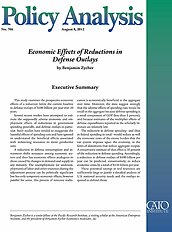Several recent studies have attempted to estimate the supposedly adverse economic and employment effects of reductions in government spending generally, and defense outlays in particular. Such studies have tended to exaggerate the harmful effects of spending cuts and have ignored or understated the beneficial effects associated with redirecting resources to more productive uses.
A reduction in defense consumption and investment shifts resources among economic sectors and thus has economic effects analogous to those caused by changes in demand and supply in any industry. The unemployment (or underemployment) of labor and other resources during the adjustment process can be politically significant but has only temporary economic effects; however painful for some, this process of resource reallocation is economically beneficial in the aggregate over time. Moreover, the data suggest strongly that the adverse effects of spending cuts would be small in the aggregate because defense spending is a small component of GDP (less than 5 percent), and because estimates of the multiplier effects of defense expenditures reported in the scholarly literature are relatively low.
The reduction in defense spending—and thus in federal spending in total—would reduce as well the economic costs of the excess burden that the tax system imposes upon the economy, in the form of distortions that reduce aggregate output. A conservative estimate of that effect is 35 percent of the reduction in defense spending. Accordingly, a reduction in defense outlays of $100 billion per year can be predicted, conservatively, to reduce economic costs by a total of $135 billion per year. These potential savings in real resources are sufficiently large to justify a detailed analysis of U.S. national security needs and the outlays required to defend them.

